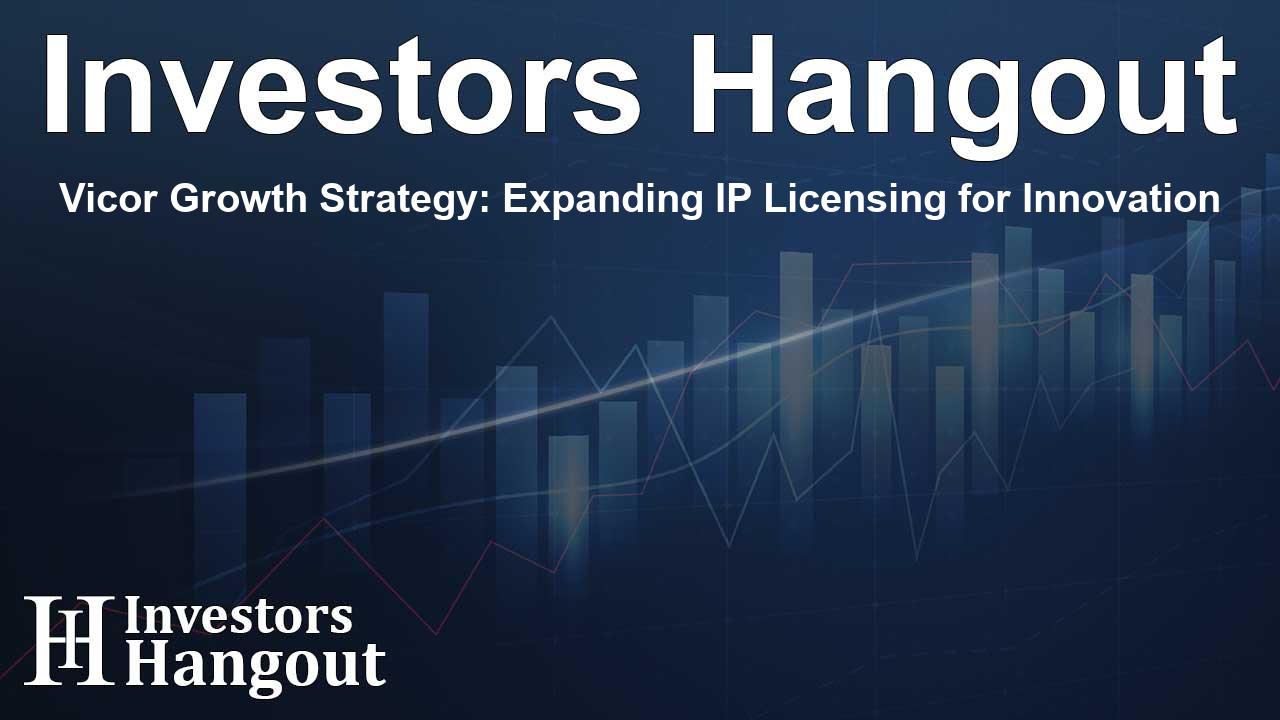Vicor Growth Strategy: Expanding IP Licensing for Innovation

Vicor's Commitment to IP Licensing Growth
Vicor Corporation is on the forefront of revolutionizing power systems with its innovative high-density technology. This commitment extends beyond mere production to encompass a robust approach to Intellectual Property (IP) licensing. As industries become increasingly reliant on power system solutions, especially in burgeoning sectors like artificial intelligence, Vicor’s IP management has become pivotal.
Significance of Vicor’s IP Portfolio
The cornerstone of Vicor’s strategy is its extensive portfolio, which features advanced technologies such as 800V, 48V, and 12V bus converters, including Vertical Power Delivery (VPD). These innovations are integral to maintaining resilience in the supply chain and ensuring scalability across various applications spanning computing, automotive, and industrial sectors. Without proper licensing, companies may face significant barriers, including potential bans or injunctions due to patent infringements, especially from competitors who attempt to replicate Vicor's innovations.
The Impact of Limited Exclusion Orders
Recently, the International Trade Commission implemented a Limited Exclusion Order (LEO) prohibiting the import of bus converters that infringe on Vicor's patents. This move is designed to protect Vicor’s intellectual assets, effectively barring certain computing systems that incorporate these innovations from entering the U.S. market. This measure reflects Vicor's commitment to defending its technology against unauthorized use, ensuring that the integrity of its innovations is preserved.
Strategic Leadership in IP Licensing
The growth of Vicor's licensing practice is primarily spearheaded by Andrew D’Amico, who serves as the General Counsel for Intellectual Property. With the support of both internal and external legal teams, Vicor is strategically positioned to leverage its IP for growth. This structured licensing strategy not only fosters relationships with original equipment manufacturers (OEMs) and hyper-scalers but also creates new revenue streams, contributing nearly $300 million in projected revenues through 2026.
The Financial Upsides of Licensing
With licensing revenues surpassing investments in research and development, Vicor has demonstrated a successful model that prioritizes innovation over imitation. The firm's commitment of 18% of revenues to R&D significantly outpaces that of competing firms that rely on infringing technologies. This strategic investment highlights Vicor's dedication to setting industry standards in performance and quality.
Future of Vicor’s Business Model
Vicor’s high-density power systems are integral to achieving superior performance in computing applications. As the demand for efficient power systems grows, the company’s IP licensing may become an even larger part of its business strategy. The use of fifth-generation ChiP™ technologies and enhanced VPD systems positions Vicor not only to grow its licensing revenues but also to expand its module sales, creating a positive feedback loop that fuels further innovation.
Addressing Market Needs
As the marketplace evolves, OEMs and hyperscalers are increasingly realizing the necessity of holding valid licenses or expanding existing ones. Vicor’s direct approach to licensing and its aggressive strategies to prevent access to infringing systems further solidify its stance as a leader in the power systems market.
Conclusion
In summary, Vicor Corporation is not just advancing power system technology; it is also redefining how IP licensing can drive growth and innovation. Through strategic management of its IP portfolio, Vicor is poised to maintain its leadership position while protecting its intellectual assets from infringement.
Frequently Asked Questions
What is Vicor Corporation known for?
Vicor Corporation is recognized for its modular power components and complete power systems that utilize patented technologies, primarily in high-density applications.
What role does IP licensing play in Vicor's strategy?
IP licensing is crucial for Vicor as it ensures access to its advanced technologies, prevents infringement, and creates significant revenue streams.
Who leads Vicor's IP licensing efforts?
Andrew D’Amico serves as the General Counsel for Intellectual Property, overseeing the company's licensing strategy.
How has the Limited Exclusion Order impacted Vicor?
The LEO has protected Vicor's patents by banning the importation of infringing products into the U.S., which helps secure their market position.
What future growth opportunities does Vicor foresee?
Vicor anticipates growth through expanded IP licensing and increased demand for its innovative power systems across multiple industries.
About The Author
Contact Logan Wright privately here. Or send an email with ATTN: Logan Wright as the subject to contact@investorshangout.com.
About Investors Hangout
Investors Hangout is a leading online stock forum for financial discussion and learning, offering a wide range of free tools and resources. It draws in traders of all levels, who exchange market knowledge, investigate trading tactics, and keep an eye on industry developments in real time. Featuring financial articles, stock message boards, quotes, charts, company profiles, and live news updates. Through cooperative learning and a wealth of informational resources, it helps users from novices creating their first portfolios to experts honing their techniques. Join Investors Hangout today: https://investorshangout.com/
The content of this article is based on factual, publicly available information and does not represent legal, financial, or investment advice. Investors Hangout does not offer financial advice, and the author is not a licensed financial advisor. Consult a qualified advisor before making any financial or investment decisions based on this article. This article should not be considered advice to purchase, sell, or hold any securities or other investments. If any of the material provided here is inaccurate, please contact us for corrections.
